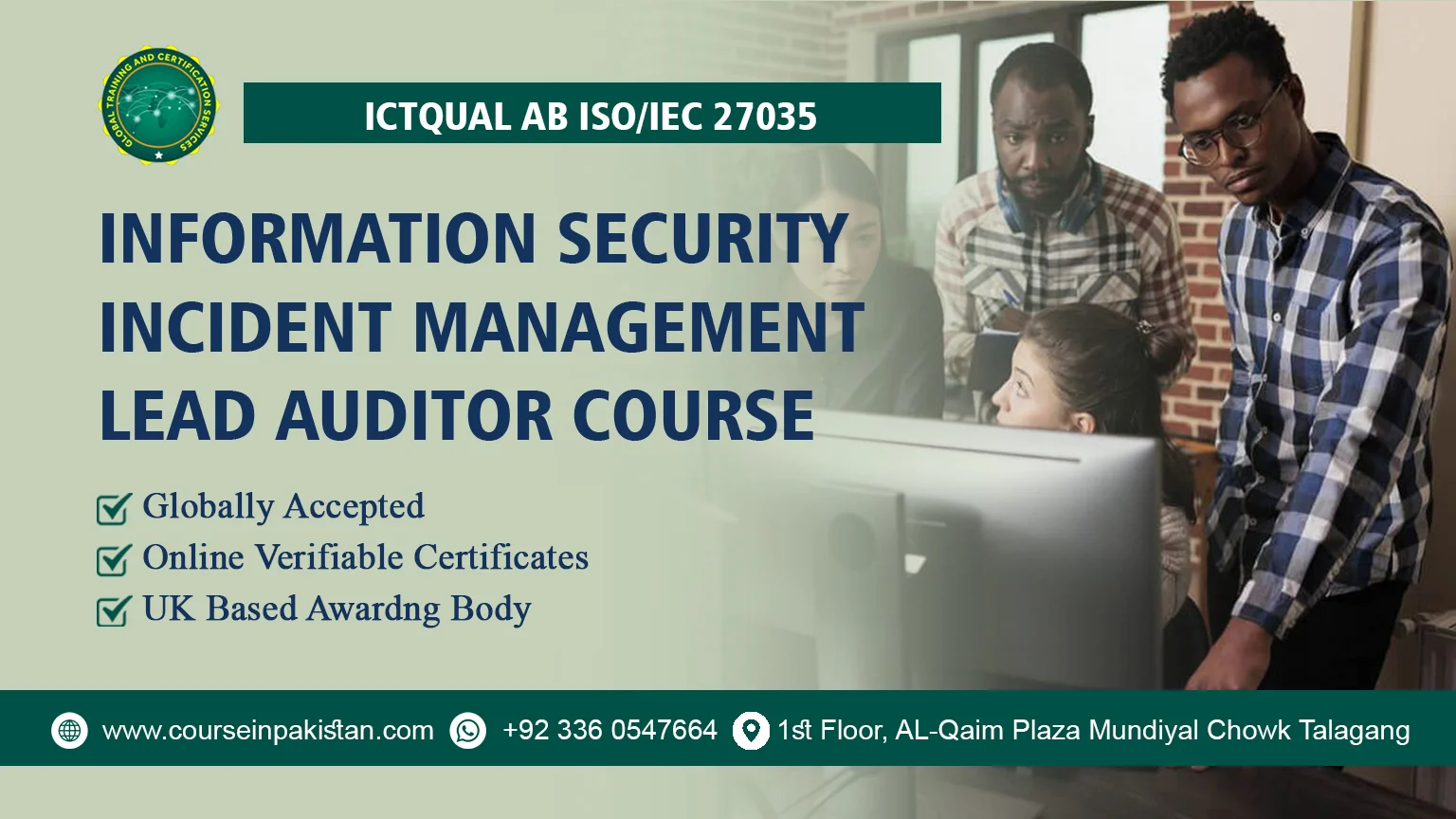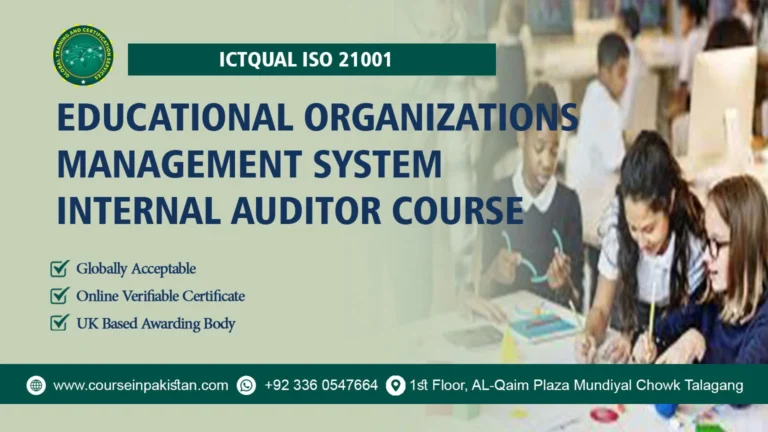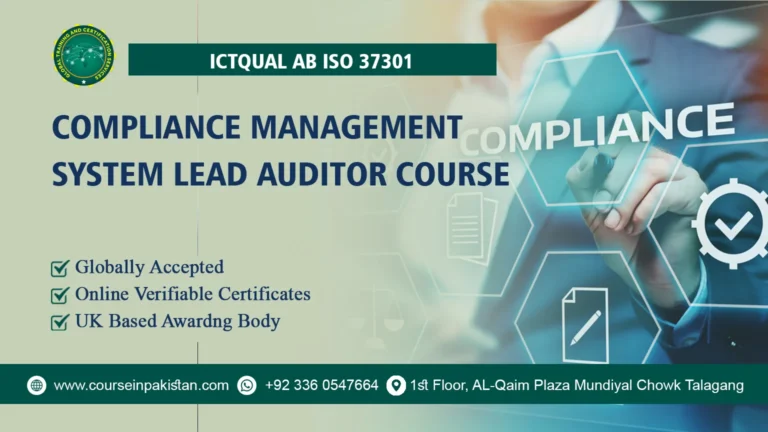
ICTQual ISO/IEC 27035 Information Security Incident Management Lead Auditor Course
In the digital age, where organizations face increasingly sophisticated cyber threats, effective incident management is paramount to safeguarding sensitive information and maintaining operational resilience. The ISO/IEC 27035 Information Security Incident Management Lead Auditor Course equips professionals with the expertise to audit and enhance incident management systems according to international standards. This specialized training empowers participants to lead efforts in identifying, responding to, and mitigating information security incidents, ensuring organizational readiness and resilience.
Course Introduction
ISO/IEC 27035 provides guidelines for establishing, implementing, maintaining, and improving Information Security Incident Management Systems (ISIMS). The Lead Auditor course focuses on training individuals to audit ISIMS against ISO/IEC 27035 standards. This certification ensures that organizations can effectively manage information security incidents, minimize impact, and protect critical assets.
Course Overview
The course encompasses comprehensive modules designed to delve into the intricacies of incident management system auditing. Participants gain insights into auditing techniques, incident response planning, forensic investigations, and strategies for continuous improvement tailored to information security.
Course Benefits
Enrolling in the ISO/IEC 27035 Lead Auditor Course offers numerous benefits:
- Specialized Expertise: Develops specialized knowledge in auditing information security incident management systems.
- Career Advancement: Enhances career prospects in cybersecurity management, incident response, and auditing roles.
- Organizational Resilience: Equips organizations with tools to effectively respond to and recover from information security incidents.
- Global Recognition: Demonstrates commitment to international standards and enhances credibility globally in information security.
Course Study Units
The curriculum typically covers essential study units such as:
- Introduction to Information Security Incident Management
- Fundamentals of ISO/IEC 27035
- Information Security Incident Management Framework
- Risk Assessment and Incident Classification
- Incident Detection and Reporting
- Incident Response and Handling
- Post-Incident Activities and Lessons Learned
- Audit Principles and Practices
- Lead Auditor Responsibilities
- Audit Documentation and Follow-up
Learning Outcomes
Introduction to Information Security Incident Management
Learning Outcomes:
- Understand the importance of information security incident management within organizations.
- Identify key concepts and principles related to incident management.
- Explain the benefits of implementing effective incident management practices.
- Recognize the role of incident management in maintaining operational resilience and protecting critical assets.
Fundamentals of ISO/IEC 27035
Learning Outcomes:
- Summarize the purpose and scope of ISO/IEC 27035.
- Outline the structure and key components of ISO/IEC 27035.
- Understand how ISO/IEC 27035 enhances incident management capabilities.
- Evaluate the benefits of aligning incident management practices with ISO/IEC 27035 requirements.
Information Security Incident Management Framework
Learning Outcomes:
- Identify the components of an Information Security Incident Management Framework.
- Describe the phases and activities involved in incident management.
- Analyze best practices and case studies of successful incident management frameworks.
- Recommend strategies to enhance incident management processes within organizations.
Risk Assessment and Incident Classification
Learning Outcomes:
- Conduct risk assessments to identify potential security incidents.
- Classify incidents based on severity, impact, and organizational priorities.
- Assess the effectiveness of incident classification criteria in prioritizing response efforts.
- Recommend improvements to incident classification frameworks based on risk assessment findings.
Incident Detection and Reporting
Learning Outcomes:
- Develop strategies for detecting security incidents promptly.
- Establish protocols for incident reporting and escalation.
- Evaluate the efficiency of incident detection and reporting mechanisms.
- Implement measures to enhance incident detection capabilities within organizations.
Incident Response and Handling
Learning Outcomes:
- Define incident response procedures and workflows.
- Coordinate incident response efforts across organizational departments.
- Apply incident handling techniques to contain and mitigate security incidents.
- Ensure compliance with incident response plans and regulatory requirements.
Post-Incident Activities and Lessons Learned
Learning Outcomes:
- Conduct post-incident reviews to analyze root causes and lessons learned.
- Identify strengths and weaknesses in incident response strategies.
- Develop action plans to address vulnerabilities and improve incident response capabilities.
- Facilitate knowledge sharing and continuous improvement based on incident review findings.
Audit Principles and Practices
Learning Outcomes:
- Define auditing principles and their application in information security incident management.
- Develop a structured approach to planning, conducting, and reporting incident management audits.
- Apply audit methodologies to assess compliance with ISO/IEC 27035 requirements and organizational policies.
- Ensure objectivity, impartiality, and integrity throughout the auditing process.
Lead Auditor Responsibilities
Learning Outcomes:
- Outline the responsibilities and competencies of a Lead Auditor in information security incident management.
- Coordinate audit activities, including team selection, scheduling, and resource allocation.
- Ensure adherence to audit objectives, scope, and timelines.
- Provide leadership and guidance to audit teams throughout the auditing process.
Audit Documentation and Follow-up
Learning Outcomes:
- Prepare comprehensive audit documentation, including audit plans, checklists, and reports.
- Document audit findings, conclusions, and recommendations accurately and objectively.
- Communicate audit results effectively to stakeholders, including management and regulatory authorities.
- Monitor the implementation of audit recommendations and verify closure of identified issues.
These learning outcomes collectively prepare participants to effectively audit Information Security Incident Management Systems (ISIMS) against ISO/IEC 27035 standards. They ensure alignment with best practices, compliance with regulatory requirements, and continuous improvement in incident management practices within organizations.
Who Should Take This Course
The course is ideally suited for IT security managers, incident response team members, auditors, and professionals responsible for managing or auditing information security incident management systems within organizations. It is particularly valuable for those looking to deepen their understanding of ISO/IEC 27035 requirements and advance their careers in cybersecurity management, incident response, and auditing roles.
Future Progression for This Course
Successful completion of the ISO/IEC 27035 Lead Auditor Course opens doors to several opportunities:
- Advanced Certifications: Pursue advanced certifications in cybersecurity management or related standards.
- Consultancy Roles: Provide expert advice on implementing ISO/IEC 27035 and improving incident management practices.
- Organizational Leadership: Lead initiatives to enhance incident response capabilities, mitigate risks, and ensure regulatory compliance.
- Continuous Learning: Stay updated with emerging threats, technologies, and best practices in incident management to maintain organizational readiness and resilience.
ISO/IEC 27035 Information Security Incident Management Lead Auditor Course is essential for organizations seeking to fortify their defenses against cyber threats and maintain operational continuity. It equips professionals with the skills to audit incident management systems against international standards, ensuring compliance, continuous improvement, and ultimately contributing to enhanced information security and organizational resilience. As cyber threats evolve, the demand for qualified auditors proficient in ISO/IEC 27035 is set to increase, making this course a valuable investment in both personal career development and organizational security posture in the digital era.






